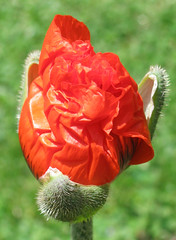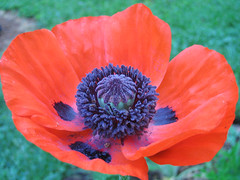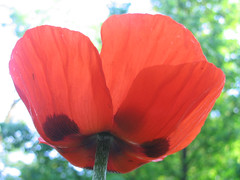Oriental Poopy
It’s sort of a running joke on GardenWeb to refer to poppies as poopies. I think it all started with a typo that turned out to be so amusing no one could let it to. It certainly grabs your attention.* This post, though, is about poppies, not poop.
I winter-sowed oriental poppy seeds last winter in an effort to follow Mrs. Greenthumbs’ recommendation of the “magnificent seven.” The poppies, along with the delphinium, also among the magnificent seven, failed to germinate. After seeing everyone else’s gorgeous poppy photos last June, I plunked down the cash for bare roots in the fall.
The fleshy roots sent up leaves almost immediately and I very nearly pulled the ugly foliage before realizing that this was my poppy. As the weather warmed, the plant grew larger, but no lovelier. I had to keep reminding myself that it was NOT a weed. The thick snout of a flower bud, rising above the greenery, promised redemption.
 Incredibly, I don’t believe I’ve ever seen a poppy outside of a photograph. I’ve seen fields of California poppies (Eschscholzia californica), but never a true papaver poppy. As the thick sepals parted to reveal the vibrant petals within, my anticipation increased. Even half-open, I was mesmerized by its beauty, and reminded of Michael Pollan’s** description of the incipient flower as a bright, silken parachute.
Incredibly, I don’t believe I’ve ever seen a poppy outside of a photograph. I’ve seen fields of California poppies (Eschscholzia californica), but never a true papaver poppy. As the thick sepals parted to reveal the vibrant petals within, my anticipation increased. Even half-open, I was mesmerized by its beauty, and reminded of Michael Pollan’s** description of the incipient flower as a bright, silken parachute.
 The following day, the petals had completely unfurled and I documented the enormous blossom with photographs of my own. This turned out to be fortuitous, because by evening, only half the flower remained. I’m not sure whether to blame the flower or Mr. Tibbs. Perhaps someone will comment on the longevity of their poppy blooms?
The following day, the petals had completely unfurled and I documented the enormous blossom with photographs of my own. This turned out to be fortuitous, because by evening, only half the flower remained. I’m not sure whether to blame the flower or Mr. Tibbs. Perhaps someone will comment on the longevity of their poppy blooms?
I am awaiting the opening of the second bud (already somewhat damaged by the aforementioned kitty). I hope I get to enjoy it for longer than a single day, or I will find this flower poopy, indeed.
*Regarding typos and titles, when my high school English teacher gave us a lecture on titling, he relayed the story of a student who inadvertantly turned in an assignment titled “1000 Pubic Lice.” (He meant “Public.”) In the end, the student let the title remain because it proved more interesting than the original. It was a good lesson in serendipitous titling, but I can’t help wondering what a story about 1000 lice (public or pubic) could be like.
**Michael Pollan wrote the fascinating “Opium Made Easy” article for Harper’s on the cultivation of papaver somniferum in the U.S.

I winter-sowed oriental poppy seeds last winter in an effort to follow Mrs. Greenthumbs’ recommendation of the “magnificent seven.” The poppies, along with the delphinium, also among the magnificent seven, failed to germinate. After seeing everyone else’s gorgeous poppy photos last June, I plunked down the cash for bare roots in the fall.
The fleshy roots sent up leaves almost immediately and I very nearly pulled the ugly foliage before realizing that this was my poppy. As the weather warmed, the plant grew larger, but no lovelier. I had to keep reminding myself that it was NOT a weed. The thick snout of a flower bud, rising above the greenery, promised redemption.
 Incredibly, I don’t believe I’ve ever seen a poppy outside of a photograph. I’ve seen fields of California poppies (Eschscholzia californica), but never a true papaver poppy. As the thick sepals parted to reveal the vibrant petals within, my anticipation increased. Even half-open, I was mesmerized by its beauty, and reminded of Michael Pollan’s** description of the incipient flower as a bright, silken parachute.
Incredibly, I don’t believe I’ve ever seen a poppy outside of a photograph. I’ve seen fields of California poppies (Eschscholzia californica), but never a true papaver poppy. As the thick sepals parted to reveal the vibrant petals within, my anticipation increased. Even half-open, I was mesmerized by its beauty, and reminded of Michael Pollan’s** description of the incipient flower as a bright, silken parachute. The following day, the petals had completely unfurled and I documented the enormous blossom with photographs of my own. This turned out to be fortuitous, because by evening, only half the flower remained. I’m not sure whether to blame the flower or Mr. Tibbs. Perhaps someone will comment on the longevity of their poppy blooms?
The following day, the petals had completely unfurled and I documented the enormous blossom with photographs of my own. This turned out to be fortuitous, because by evening, only half the flower remained. I’m not sure whether to blame the flower or Mr. Tibbs. Perhaps someone will comment on the longevity of their poppy blooms?I am awaiting the opening of the second bud (already somewhat damaged by the aforementioned kitty). I hope I get to enjoy it for longer than a single day, or I will find this flower poopy, indeed.
*Regarding typos and titles, when my high school English teacher gave us a lecture on titling, he relayed the story of a student who inadvertantly turned in an assignment titled “1000 Pubic Lice.” (He meant “Public.”) In the end, the student let the title remain because it proved more interesting than the original. It was a good lesson in serendipitous titling, but I can’t help wondering what a story about 1000 lice (public or pubic) could be like.
**Michael Pollan wrote the fascinating “Opium Made Easy” article for Harper’s on the cultivation of papaver somniferum in the U.S.



8 Comments:
Lovely flowers, though I admit I mostly like them because the name Poppy is so delightful. Equally delightful? Poopy.
I hate to be the bearer of bad news, Kasmira, but they do NOT last long at all. If it 's windy or rainy one or two days is about it.
I think that is why I am so facinated with them. If they lasted all summer, I would certainly tire of their bold orange color.
I feel better now, because the poppy seeds I planted went poopy too. :) So I am not the only one.
My backyard neighbor has beautiful poppies. She has red ones, and then pink ones too. They are fabulous.
i saw wild poppies today growing on derelcit land on a roundabout.they are very short lived poppies, few days.They are symbolic of world war one here because after the fighting ending the fields filled with blood red poppies.They are beautiful flowers though..
Poppies are high on my list for next year and seeing as how I can't grow anything from seed, I'm not even going to bother trying. Where'd you get bare roots?
I have a journalism degree and our college had a public relations degree program as well. The stories we heard about resumes sent out with "Pubic Relations" degrees or internships were almost too much to take.
GO - Sorry to take so long to answer your question! I ordered the poppy from VanDyck's. It took me awhile to figure it out.
http://cinticapecod.blogspot.com/2005/08/shopping-spree.html
This comment has been removed by a blog administrator.
This comment has been removed by a blog administrator.
Post a Comment
<< Home